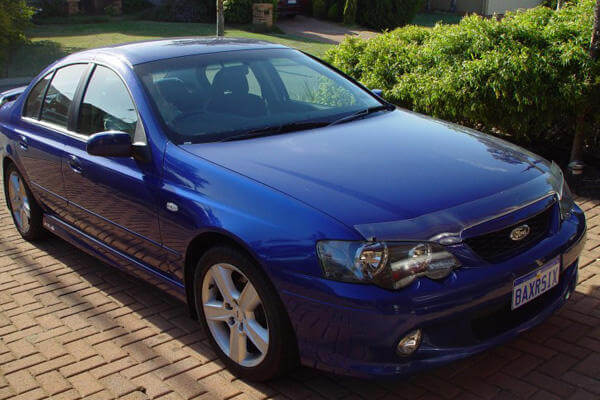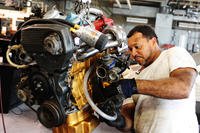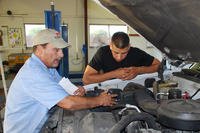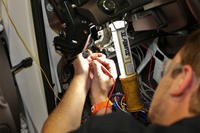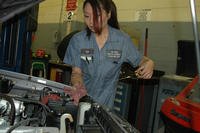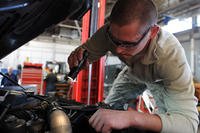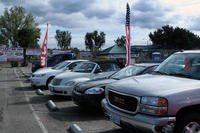This content is provided courtesy of USAA.
There's a lot to be said for buying a quality used car. They're generally less expensive than their new counterparts, and the first owner bears the brunt of depreciation. But if you're in the market for a gently used vehicle that's just a couple of years old, you might be in for a new form of sticker shock.
Slow sales of new cars in recent years have created a shortage of late-model used cars, and that has pushed used-car prices to historically high levels, says Jesse Toprak, vice president of industry trends for TrueCar.com.
"In this tight economy, demand is high for reliable, affordable used cars," he says. "There are fewer late-model used cars on the lot. So prices go up."
Prices are especially higher for small, fuel-efficient vehicles, says Toprak, so buyers looking for large trucks and SUVs might find better deals. Regardless of the vehicle you're seeking, buying used still can be a wise move. You just have to put on your bargain-hunting hat.
"Consumers can get the best deal if they are educated before they get to a dealer's lot," says Steve Thompson, vice president of USAA Consumer Lending. Understanding their specific car needs and having a working knowledge of current prices and how dealers negotiate on used vehicles is key."
Increase your confidence in finding a good deal by using online tools to compare makes and models, find specific cars and check out their histories. And before you buy, follow these four strategies to help find a used car that fits your budget and lifestyle.
1. Mind Your Money Matters
- Figure out how much you can afford. If you'll be selling your current vehicle, consider its cash value, any additional down payment you'll make and what monthly payment fits comfortably in your budget. If you have to stretch the loan term any longer than five years to afford the payments, it's probably time to consider a cheaper car.
- Websites such as Kelly Blue Book and TrueCar can help you determine the selling price of your current vehicle and how much you can expect to pay for the used car you're eyeing based on where you reside.
- Get a quote for auto insurance to help you understand what it will truly cost to drive the car you're considering. An added benefit of buying used is that the cost for collision and comprehensive coverage is generally lower than the cost for new cars of the same style.
- If you'll be financing the purchase, look into auto loans through USAA Bank or another financial institution that might offer lower interest rates than a car dealer. Heading into your purchase with preapproved financing also will help simplify the negotiation process, since you essentially become a cash buyer to the dealer and take other factors out of the conversation.
| Can buying new be better? |
|---|
|
While used cars still typically are less expensive than new ones, the price gap has been narrowing. High demand for and a shortage of used vehicles have pushed up resale values. At the same time, automakers have been working hard to draw even the most budget-conscious buyers back to the showroom. If the right buying conditions align, a brand-new car could be worth a look. Here's why: Low depreciation: Despite the rule of thumb that new cars depreciate by 20% in the first year off the lot, some makes and models hold their value much better than that. This alone won't make buying new cheaper than buying used, but it could narrow the long-term cost difference, especially if you don't plan to drive the car for more than a few years. For example, buying a new Honda Accord, which earns ALG's best depreciation rating, might be more attractive than paying nearly the same price for a gently used model. Manufacturer and dealer incentives: Though the auto industry is on the rebound, car buyers in recent years have been landing some deep discounts on new vehicles — and big trucks in particular. Sometimes these rebates are even combined with offers of very low financing rates. A deal like that could make the total cost comparable to a slightly used version with no rebate and standard financing. Warranty: A car that's under warranty is more valuable because it comes with cost-free repairs for a period of time. |
2. Find the Right Fit
- When deciding on a make and model, prioritize the list of the features that are most important to you: styling, engine power, gas mileage, seating capacity, cargo space and so on. Be sure to base your list on your everyday realities (e.g. highway commuting), not your daydream scenario (climbing mountain trails).
- Be flexible. By remaining open to two or three models that would meet your needs, you should have an easier time finding a suitable vehicle at a good price. And for a real apples-to-apples comparison of different models, keep in mind that different makes of vehicles in a given class might depreciate at different rates. In other words, give bonus points to a car that tends to hold its value longer, thus costing you less in the long run. Research depreciation ratings here.
- Dozens of websites, such as Cars.com and Autotrader.com, let you explore the universe of choices by searching classified ads and dealer inventories in your area.
3. Size Up the Seller
Who's selling the car might give you some indication of the deal you're getting.
Private Individuals: Newspaper classified ads and automotive websites can connect you to thousands of people looking to sell their cars. This is typically the path to finding that holy grail of cars only driven to church on Sundays.
- When buying from an individual, take precautions to protect yourself against theft and fraud. Arrange to test drive used vehicles only during the daytime in public places, and don't carry large amounts of cash with you. Also, before finalizing the deal, double-check the vehicle information, especially the vehicle identification number, to ensure the title matches the seller's name.
- Sites such as Craigslist and eBay also are good places to find cars, but watch out for scams involving wire transfers or cashier's checks. Unsuspecting buyers have been duped into paying for cars that were never delivered.
New-car dealerships: Many big dealers also have used-car lots, where many of the vehicles for sale have been professionally cleaned and inspected. For a guarantee of quality, certified preowned cars come with a written promise that the vehicle is in trouble-free condition and is backed by a warranty. While these services offer you more peace of mind, they also increase the price.
Independent used-car lots: Like new-car dealerships, these businesses need to cover overhead and make a profit. But good deals can be found everywhere, so don't overlook these lots just because they lack the sparkle of a big dealership.
Other sources: Sometimes bargains pop up in less traditional outlets. For example, rental car companies often sell their retired fleet vehicles to the public. And auto dealers and other large employers sometimes sell vehicles that were once used as company cars. Repossession auctions, held online or by local brokers, could be another source. Check the bulletin board at work. Investigate these cars the same way you would any vehicle offered for sale by an individual or a dealership.
4. Do Your Due Diligence
- When you view a used car in person, check the vital signs — model year, mileage, tire tread, etc. — to get an idea of how long the car will continue to be maintenance-free. Keep in mind that factory warranties usually are transferrable, so a late-model car could come with free repairs of covered systems for a period of time.
- Test drive any vehicle you're seriously considering, turning on all the bells and whistles to make sure it performs to your liking. Don't limit your drive to neighborhood roads — hit the highway to properly test the car's acceleration, handling, braking and comfort.
- Run a background check on the car using a service such as Carfax.com, which can help you verify the ownership history and mileage and whether the vehicle has undergone any major repairs. If the report reveals disturbing information that the seller didn't disclose, walk away.
- If possible, run the car by a trusted mechanic's shop for an under-the-hood inspection with a trained eye.
